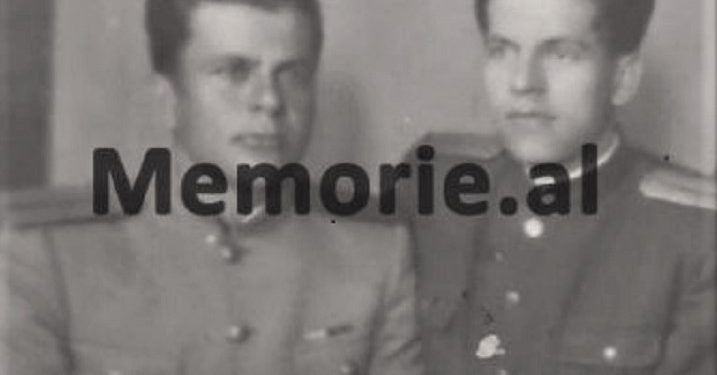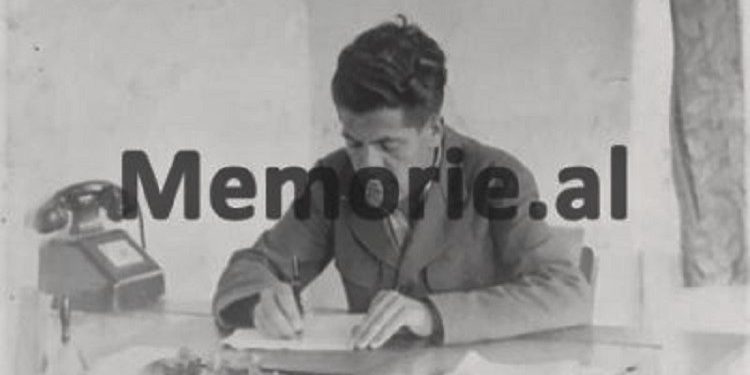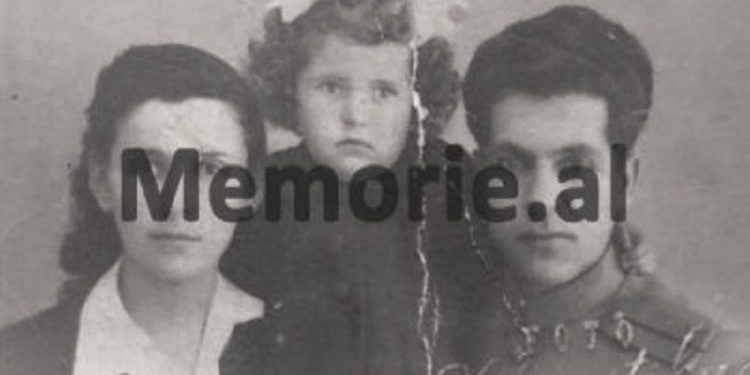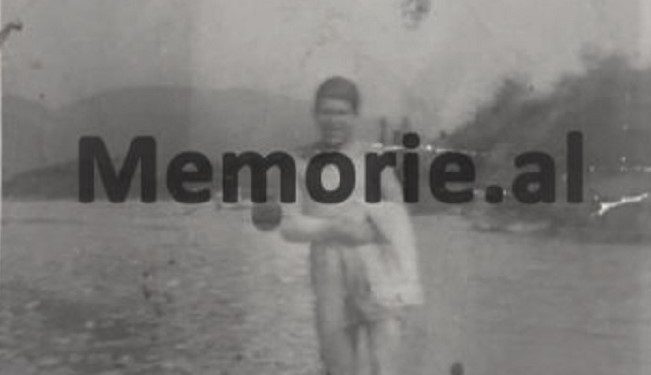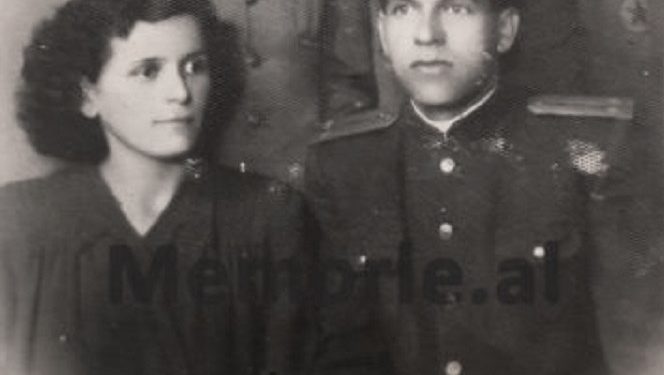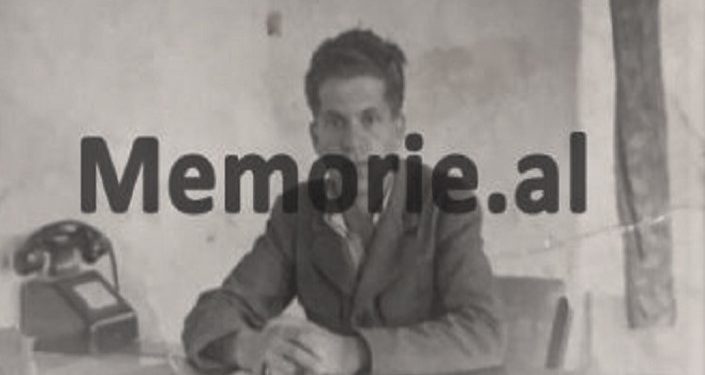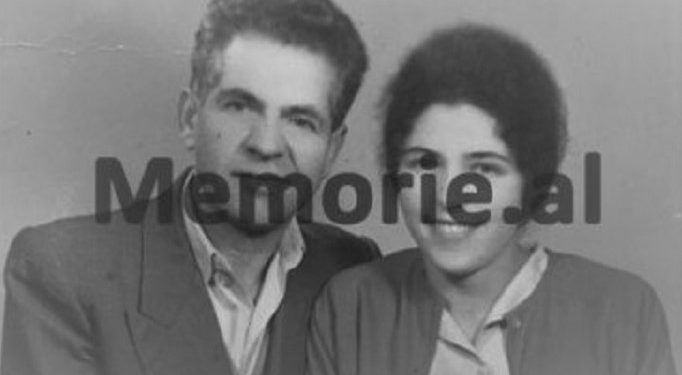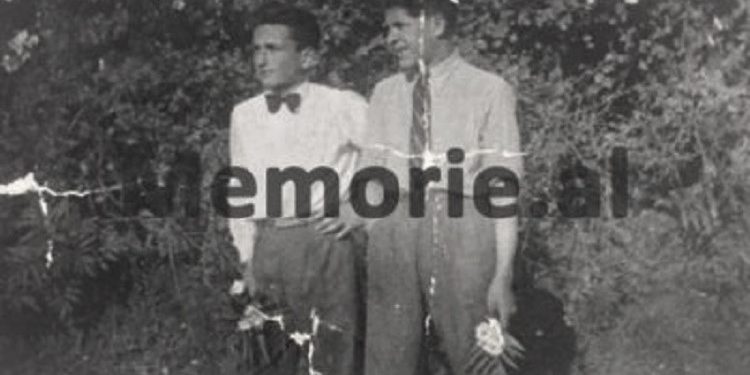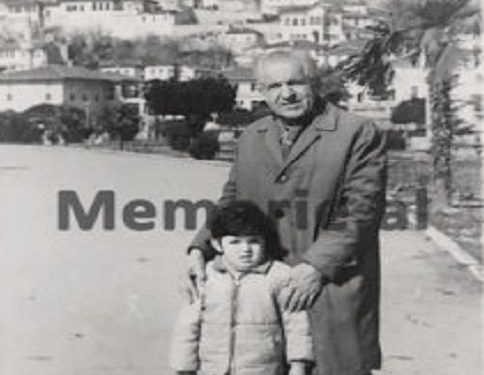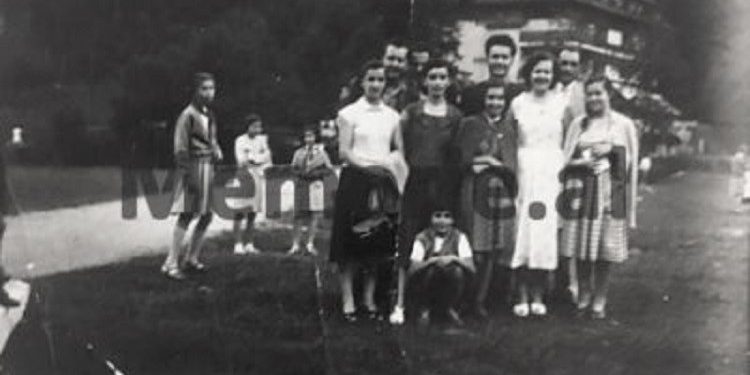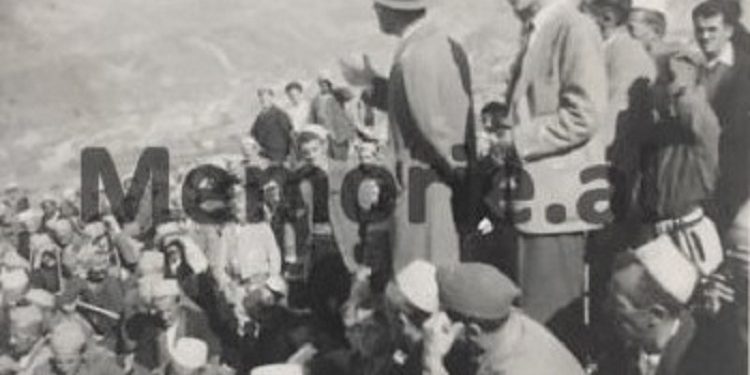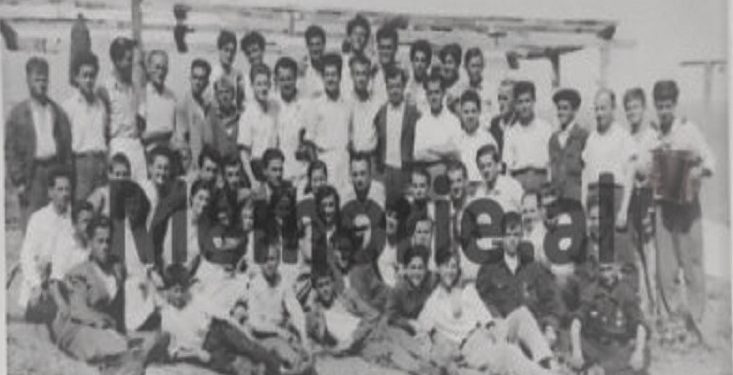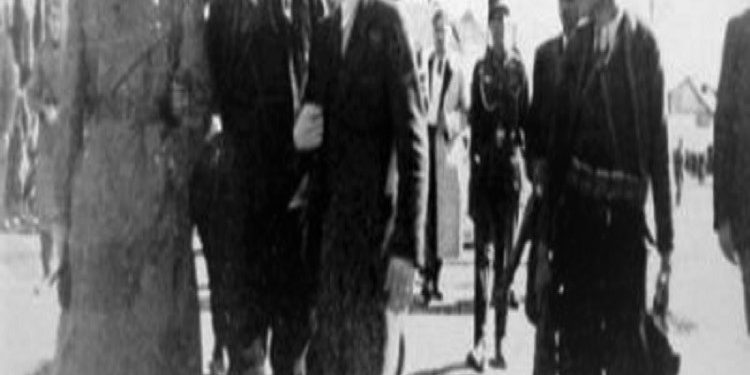Dashnor Kaloçi
Memorie.al publishes the unknown story of Albanians imprisoned by the Germans in the Extermination Camp in Prishtina where on October 23, 1944, the camp command shot 104 convicts, after Enver Hoxha broke the agreement with the Germans by not handing over the three German girls being held hostage from the General Staff in Tirana, while the rest of the Albanian prisoners escaped from the bullet only thanks to the intervention of the Minister of Regency, Xhelal Mitrovica, who met with the German command and told them that the camp was surrounded by forces. Kosovars, who would not allow their departure without handing over all Albanians held there in isolation. The rare testimony comes from Kristo Budo, one of the Albanians convicted in that camp for his activities as a communist, who escaped alive from the Nazi camp and after returning to Albania, held several senior positions in the Ministry of Interior and local government inspector at the Prime Minister’s Office, but after the arrest and death sentence of his father, accused of being a “Greek agent”, Kristo also ended up in handcuffs, being barbarically tortured by the infamous investigator, Nevzat Haznedari. After suffering ten years in prison and internment in the Zvërnec Camp, he was released from the 1982 amnesty after being over 60 years old.
By mid-November 1944, we prisoners in the infamous Pristina camp had fallen into a great dilemma as to what would happen to us: would the Germans who were retreating to Berlin take us with them, or would they take us? shot there. But thankfully neither happened because the camp command left along with the other German troops and set us free by not executing and covering us in the special pits that had been dug by the prisoners themselves, as had been done plan in advance. This happened because in the last moments that the Germans would implement their plan for our execution, the Kosovar Xhelal Mitrovica, one of the Ministers of the Albanian Government during the Regency period, met with the German command of the camp and told them: You are surrounded by Kosovar forces and we will not allow you to leave without handing over all the prisoners of the camp ”. The man who speaks and testified for Memorie.al, is Kristo Budo, who told the truth of the event of November 1944, where all the prisoners of the Prishtina Camp, could escape from there without being shot by the Germans, only thanks to the intervention of Xhelal Mitrovica, the former Minister of the Albanian Government during the German occupation, which was kept secret throughout the period of Enver Hoxha’s communist regime and was made public for the first time in more than 75 years. Who is Kristo Budo and how did he end up in Tirana prison in 1943? Who were the other prisoners who remained in solitary confinement in that prison and how did they get them on the night of August 26, 1944 to be sent to the camp? notorious of Prishtina? How was the prisoner transported and on what route did the convoy of German cars pass? Regarding these and other events from that time, the interview of Mr. Kristo Budo given to us, shortly before he passed away at his home in Tirana.
Mr. Kristo, how did you happen to be in Tirana prison at that time?
During 1942-43 I started to be active with the educational groups of the Communist Youth of Tirana and I was part of a group led by Reshat Aliaj (Ramiz Alia’s brother) and then I moved to another group led by Haki Karapici. After my activity in those educational groups had caught the eye of the Germans, in April 1944, I was arrested by them and after that I was sent to Tirana prison without being taken to court at all. After I was arrested, the Germans interrogated me but I did not tell any of my fellow communist educators. This is also confirmed by the fact that none of the friends I had worked with happened to them and were not arrested.
Who were the other prisoners you found in that prison and those who came next?
At the time I went to that prison, there were not only communist political prisoners, ex-partisans, but also many other democratic nationalists, young workers and intellectuals who hated fascism. Among them I can remember the lawyer Sulo Bogdo, the father of Vasil Shanto with his daughter Bojka, the old man Sadik Petrela, Kosta and Taqi Mema, the two Papuçiu brothers from Fier, Luigj Filip and his wife Sandra. Also known were the fighters Spiro Velko, Kin Dushi, Gjikë Kuqali, Musa Agolli, Ramazan Kruja, Bilal Ganxholli, Niko Avrami, judges Gaqo Floqi and Grigor Gjika, Hysen Dashi, etc.
How do you remember the day the Germans took you from the Tirana prison to send you to the Prishtina camp?
It was August 26, 1944, when we political prisoners in the Tirana prison were ordered to leave the courtyard of the prison, which was surrounded by numerous German soldiers. The prison administration together with the Germans appealed to us and then put us in trucks waiting to leave. In each car there was a German officer with two armed soldiers and behind each car there was an armored car.
Did you know before that they would be sent to the Prishtina camp?
Not only did we not know beforehand, but even on that day of August 27th, we did not know where we were going. On the evening of August 26 in Tirana, the news of this transfer of prisoners was opened and because of this, many people from our families gathered who were anxiously waiting for anything to happen to us.
Did the prison command know about this transfer of prisoners?
The prison command had no idea where the Germans would take us that night, and we learned this later after the end of the War. A document was found in the documents of the Prison administration, which is in the Central State Archive, stating: “It is confirmed that these persons (the list of their names follows) were taken by the Germans in the presence of Major Hamdi Jusuf and Captain Xhelal Staravecka.”
On what itinerary was your transport to Prishtina?
The convoy of German cars crossed the national road Tirana-Milot-Shkodra. That night we were held in the city of Shkodra in an open field surrounded by barbed wire. The next day the Germans brought us many other political prisoners, men and women who had been in Shkodra prison. Among them I remember Lazar Silic, Sabah Hilmi, Gac Mazin, Stefan and Vasil Pistolin, Qemal Jashari, Seit Boshnjaku, Vladimir Misjen, sisters Marie (Varfi) and Despina (Trimchiev). The next night, the convoy of German cars where we were, continued the road Shkodër-Pukë-Kukës and from there we were stopped in the city of Prizren. That morning when we left Shkodra, the people of that city gave us a really nice escort greeting us on both sides of the road. When we arrived in Prizren we started singing patriotic songs which woke up many citizens who came out of the windows. After Prizren we continued the road to Prishtina, where we were stopped near some barracks where the camp was installed.
How did you settle in that camp?
When we arrived at the Pristina camp, German soldiers got out of our cars, shouting at us and whipping us. There we were placed in silos, in one of them we, the prisoners of Tirana, and in the other, those of Shkodra. Where the women were placed in two rooms next to our camp, but separated by a barbed wire fence. There were about 200 of us in those two silos, and we slept next to each other as hard as we could. There we found other Kosovar internees, Serbs, Montenegrins, Italians, and some Jews, and from the contacts with them we learned about the inhuman treatment of prisoners and especially about the shootings that had taken place up to that time, especially Kosovar prisoners…
What about the time you went to that camp, were there any shootings?
It had not been long since the day we went there, the Germans took 26 prisoners who were all from Shkodra and shot them on the outskirts of the city of Kukes. This act by the Germans was done as a sign of revenge, because in those days the partisans had attacked a Nazi convoy that was retreating on the Kukës-Prizren road, where they had killed several soldiers. After the shooting of 26 prisoners from Shkodra, the Germans continued again and on the night of October 23, 1944 they shot 104 Albanian prisoners from that camp.
What is the truth of the shooting of 104 prisoners, because it is said that the Germans executed them, after Enver Hoxha broke the agreement he had made with them? for the release of three German girls held hostage in Tirana by partisan forces?
The same agreement that you are asking about was talked about at that time in the Prishtina camp and almost all the prisoners were aware of this. In those days before 104 comrades were shot, word spread in the camp that an agreement had been reached between the Germans and the General Staff commanded by Enver Hoxha, for the exchange of three German girls, who were being held hostage in Tirana, with ten prisoners Prishtina Camp. This agreement, according to the words circulating in the camp, could not be realized because the General Staff did not release the three girls and the Germans in revenge shot 104 prisoners. It was also said at the time that their shooting was a sign of revenge against the 16 wounded Germans who were attacked and killed by Tirana guerrillas on Dibra Street. I do not know how true these were, but this version was discussed by us prisoners in Prishtina.
It is said that Captain Petraq Pekmezi, who served as a translator at the Gestapo, came to the Pristina camp at that time to mediate the agreement for the exchange of three German girls with the ten imprisoned communists?
Yes, Captain Petraq Pekmezi came several times to the Prishtina camp where he also released some of the prisoners who were in that camp. Petraqi is the brother of the martyr Trajan Pekmezi, he knew many things, because he mediated between the General Staff and the German command, where it was said that at that time an agreement was made between them, where the partisans would not hit the German forces. during their withdrawal from Tirana. However, these can be heard, because only Petraq Pekmezi knew their truth, whom the partisans shot in the backyard, two or three days before the liberation of Tirana. Petraqi had done a lot of work for the communists and feeling clean, he refused to leave Tirana with the Germans. But unfortunately, he was killed.
How do you remember the shooting of 104 prisoners in that German camp?
As every day and on the day of October 23, they took us to work in the early hours of the morning and took us to open trenches around Prishtina. But that day as never before near lunch we were suddenly ordered to stop work and returned to camp. In the afternoon we were all lined up outside the barracks and a German officer with a list in hand began to read the names of Tirana prisoners. Those who heard the names came out of the line and stood apart. After calling 104 people, they locked them all in one of the rooms where the women lived. When they were put there, we started arguing with each other and some said they would transfer them to another camp, but keeping them until the evening made us question whether they would be shot and this was confirmed as soon as it got dark. At that moment, the doors of the barracks were quickly closed, and gunfire was heard intermittently near the camp. After stripping them, they shot them and threw them into the pit.
Remember any of those who were shot?
I remember many of them that I knew closely. The first to be taken from the room to be shot was Sadik Petrela who, as he was leaving, said: “Boy, I am leaving because I am old.” At that time the comrades realized that they were taking him to be shot and immediately removed a plank from the ceiling and some of them like Spiro Velko, Musa Agolli, Servet Tepelena, etc., climbed up and started passing from one silo to another until they came down to our silo. The Germans realized that the prisoners were escaping from the ceiling holes and entered the silo firing with automatic weapons. There, as he had glued the body to the hole in the ceiling, Hektor Shyti from Vlora was killed, while the others were found in our hut. Four or five people like Servet Tepelena could escape from them, which the Germans could not dictate and those of the nursing. I remember Musa Agolli, when he was taken, he said: “Death to fascism, goodbye friends”. He was shot from there. It happened differently with Xhavit Jukniu, he was not on the shooting list, but when the German officer saw his head tied with a bandage, he decided to take him for shooting, remembering that he had killed him while crossing the ceiling. The desolate Xhavit told the officer that he was not on the list, but he took him and shot him.
How were you treated by the Germans in that camp and what work did you do there?
The treatment was as inhumane as in all Nazi camps. Our daily food was a tablespoon of soup or tea and a few grams of black bread. We were not allowed to buy anything, not even cigarettes, not even a packet of food from families or the International Committee of the Red Cross, as was done in other camps. Out of hunger we went to the animal stables and collected the remaining loaves of bread. When we went to work, the inhabitants of Prishtina gave us some food, especially bread, but this was dangerous because we were checked when we returned to the camp.
How did you manage to get out of that camp alive?
By the end of October 1944, taking advantage of the opportunity he had given me, I escaped from the camp along with Filip Muçi and some other friends. When I left, I went to Drenica, where the Kosmet Battalion was, while the other comrades who escaped with me joined the 18th Brigade.
What about the others?
All of us prisoners in that camp were in a big dilemma whether the Germans would take us with them to Berlin or execute us there as they were doing in other camps. But thankfully neither happened, because the camp command left along with the German troops and left us free, not executing and covering us in the pits we had dug ourselves. This miracle happened because at the last moment when the Germans wanted to implement the plan for our execution, the Kosovar Xhelal Mitrovica, one of the Ministers of the Albanian Government of the Quisling Regency, contacted the command of the camp and told them: “You are surrounded by Kosovar forces and if you will not release all the prisoners, none of you will be allowed to leave this camp. You are in transit and do not have to shoot the prisoners of the camp. “Give them to us according to the lists you have, then we will let you go.” Under these conditions, the German command was forced to accept the conditions set and was allowed to leave. Prior to that, Xhelal Mitrovica had released from that camp Gaqo Floqi, who had been a friend during his studies in the West, as well as some other families and women whom he sent on foot to Albania.
Who was Kristo Budo?
Kristo Thoma Budo was born in 1921 in the village of Postenam in Leskovik and during the years of Nazi-fascist occupation of the country, his whole family was closely associated with the Anti-Fascist War and Kristo together with their two brothers and their father, have rich and leading functions in partisan formations. After Kristo was arrested by the Germans and ended up in the Pristina Camp, he managed to escape from there and ended up in the Kosmet Partisan Battalion (Kosovo-Metohija), where he was appointed Youth Officer of the 18th Brigade and Company Commissar in the Brigade. of the 29th. In 1945, he returned from Kosovo to Albania and was appointed Commissar of the Mat district with the rank of lieutenant and then in 1946, he was appointed Political Secretary of the Bishopric Party Committee. In 1947 Kristo was appointed Deputy Director of the Internal Affairs Section of the Peshkopi District for the Police, with the rank of lieutenant and then he was transferred to Tirana as an Instructor for Education in the Political Directorate of the Ministry of Internal Affairs. In May 1949, he was appointed as Inspector of Local Government in the Prime Minister, a position he held for many years (in 1953, for a year he also worked as deputy chairman of the Executive Committee of the district of Fier) and in In 1964, Kristo was arrested by the State Security after his father, Thomai, was recently arrested on charges of being an “agent of the Greeks” and, after being sentenced to death, was shot. While Kristo, after being held for two and a half years in the Investigator being barbarically tortured in an isolated environment somewhere in the forests of Krraba, on November 24, 1967, he was tried by the Military College of the High Court and although he won innocence , he was not released, but was interned on the Island of Zvërnec in Vlora where he suffered for eight years. After the closure of the Zvërnec Camp, Kriston was deported back to the city of Berat where he worked as a laborer, and in August 1980, he was arrested again and sentenced to ten years in political prison, but was released from the 1982 amnesty. as he was over 60 years old./Memorie.al




